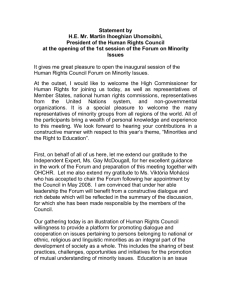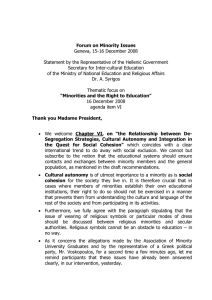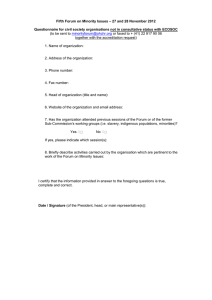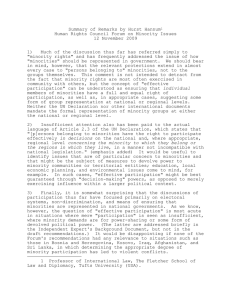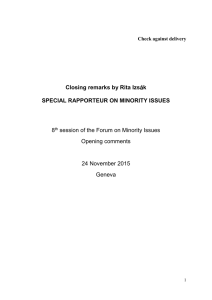Seventh Session of the United Nations Forum on Minority Issues
advertisement
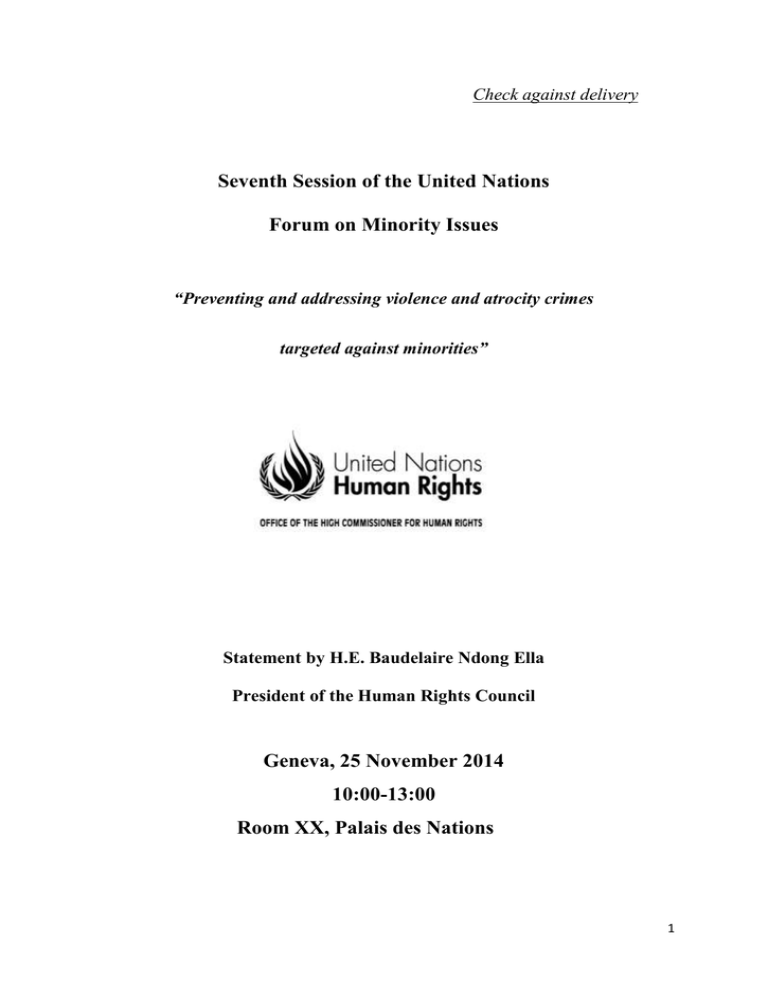
Check against delivery Seventh Session of the United Nations Forum on Minority Issues “Preventing and addressing violence and atrocity crimes targeted against minorities” Statement by H.E. Baudelaire Ndong Ella President of the Human Rights Council Geneva, 25 November 2014 10:00-13:00 Room XX, Palais des Nations 1 Mister Chair, Distinguished delegates and participants, Ladies and Gentlemen, It is a great pleasure for me to open this seventh session of the Forum on Minority Issues on “Preventing and addressing violence and atrocity crimes targeted against minorities”. Firstly, I would like to warmly welcome and congratulate Mr. Patrick Thornberry, who has kindly accepted the important task of chairing this session of the Forum. Your vast experience on the issues to be discussed and your expert guidance will undoubtedly contribute to making this Forum a success. I also send my greetings to Ms. Rita Izsák, the Special Rapporteur on minority issues, who is mandated by the Human Rights Council to guide the work of this Forum and to prepare its annual sessions. While she will be unable to join us in person at this session, I wish to acknowledge her important leadership in ensuring that this Forum addresses some of the key challenges and issues affecting minorities globally today. I would also like to welcome representatives of Member States, United Nations specialized agencies, representatives of human rights mechanisms and bodies, international and regional organizations, national human rights institutions, as well as non-governmental organizations, academics and experts. One of the main objectives of this Forum is to provide a platform for promoting dialogue and cooperation on issues pertaining to minorities. The Forum is an open space where all stakeholders involved in the promotion and the protection of the rights of minorities in all regions can meet, exchange ideas and learn from each other’s experiences. I am particularly pleased to see that this Forum has been successful in bringing together hundreds of minorities from all over the world who have travelled to Geneva to share their personal experiences and engage in a constructive dialogue. I would therefore like to extend a special welcome to all representatives from minority groups who are here today and who will contribute constructively and substantively to the Forum’s discussions. Ensuring protection of vulnerable communities, combating discrimination wherever it exists and promoting equality in all fields of life are key objectives of international human rights law and standards and among the primary objectives of the work of the Human Rights Council. The Council must and does play an important role in drawing international attention 2 to acts of violence against any community, including minorities and in seeking to prevent and halt grave human rights violations wherever they exist. In its recent special sessions on the situations in Iraq, the Syrian Arab Republic or the Central African Republic, for instance, the Council has addressed situations of violence against minorities, including communal violence and sectarian tensions. Commissions of Inquiry and other investigations have been initiated via Council resolutions to uncover the nature and extent of human rights violations including those affecting minorities. They also provide a deeper understanding of the root causes of human rights violations, violence and conflict. While these activities often come after violence has broken out, it is my profound hope that collectively we may become better at strengthening measures to prevent violence as a primary objective of States and the international community alike. In this respect, I welcome and congratulate the work of the Special Procedures mandate–holders, including the Special Rapporteur on minority issues. As independent human rights experts, they are mandated to report, advise and provide recommendations on human rights issues from a thematic and country-specific perspective. Their substantive reports frequently address specific minority concerns and offer a timely and reliable source of information for the Human Rights Council and a solid basis for protecting minorities and effectively improving the situations of minority groups worldwide. Sometimes information contained in their reports and the evidence provided by civil society is an essential early warning to the international community that we must be better at listening and responding to. It is notable that minority rights issues are also among concerns frequently raised in the work of the Council’s Universal Periodic Review. This public peer review process is an opportunity for each State to discuss actions that they have undertaken to improve the human rights situations in their countries and to fulfil their human rights obligations, including under existing international and regional standards and principles relevant to the protection of persons belonging to minorities. It is also in the area of prevention of violence and conflict that this Forum has an crucial role. Over the years since it was establishment in 2007, this body has conducted much essential work to promote minority rights as contained in the UN Declaration on the Rights of Persons Belonging to National or Ethnic, Religious and Linguistic Minorities. All of that work across many issues, including to promote minority rights in education and the effective participation of minorities in economic, political and social life, can be considered as vital to 3 to fostering good governance, respect, mutual understanding as well as social cohesion and political stability within our diverse societies. This session of the Forum is particularly timely in addressing the issue of violence and atrocity crimes against minorities. It provides a space for an open debate and an opportunity to discuss challenges, but also practical solutions to improve the protection of minorities from violence and atrocity crimes everywhere. It will also undoubtedly contribute to identifying practical ways in which together we can achieve the objectives of ensuring inclusive, harmonious, multi-ethnic and multi-faith societies in which all may live peacefully in equality and security. I therefore look forward to the recommendations that will be the outcome of your important work during this session and that will be presented by the Special Rapporteur on minority issues to the Human Rights Council in March 2015. Before concluding, I would like to reaffirm the commitment of the Human Rights Council to protect the rights and lives of individuals who cooperate with the United Nations and its mechanisms in the field of human rights. The Council condemns any act of intimidation or reprisal against such individuals and groups. As President of the Human Rights Council, I will thus continue to urge States to prevent and ensure adequate protection of those individuals against any such acts. Chairperson, Ladies and Gentlemen, I wish you all a fruitful, constructive and inter-active dialogue over the next two days and another successful Forum on Minority Issues. Thank you. 4
